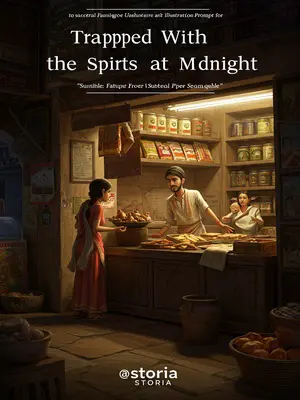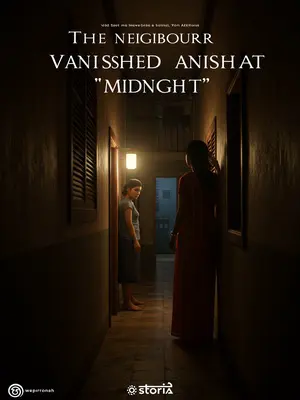Chapter 4: The Truth About the Madman
We tried to get ready for bed too, but the madman in the corridor was so loud, none of us could sleep.
Aman lay back down, pulling his blanket up to his chin, but his eyes stayed open. Kabir scrolled mindlessly through his Instagram feed, pretending to be chill. Sneha buried her head in her pillow, humming some old Bollywood tune under her breath to calm herself. But outside, the madman’s wails and the distant sound of feet running down the stairs made it impossible to relax. The old wall clock ticked louder than ever, mocking our helplessness.
Not long after, we heard the teachers from the hostel management committee arrive.
Their voices boomed up the staircase: "Arrey, kaha hai woh? Kya ho raha hai yaha?" They were accompanied by the sound of chappals slapping against the stairs and the unmistakable jingle of a keychain full of hostel room keys. A few students peeked out from the safety of their peepholes, watching as our supposed saviours arrived, looking as confused as the rest of us.
Their voices echoed down the corridor:
"Where’s the madman?"
The echoes made the corridor sound even emptier, lonelier. The teachers’ voices were tinged with nervousness—trying to sound authoritative, but betraying their own fear. Somewhere, a door creaked open, then slammed shut again. I could hear whispers from behind closed doors, people praying for this ordeal to end.
There were loud banging sounds from the hallway, but it didn’t sound like a fight.
It was more like a scuffle—chairs being dragged, maybe a cupboard tipped over. Someone shouted, "Dekh ke!" as if things were falling. The sound of glass shattering reached us, and then, abruptly, silence. My skin prickled, imagining what could be happening just a few metres from our door.
Just a shout from one of the teachers: "Hai Ram!"
That cry—full of pure shock—sent a chill through the whole building. Even the bravest of us went quiet, sensing that things had taken a turn for the worse. I could almost picture the teachers crossing themselves or muttering a quick prayer under their breath.
The commotion died down quickly.
One minute there was chaos, the next—nothing. All we heard was the hum of the old tube lights and the distant barking of street dogs. It was as if someone had pressed mute on the whole hostel. My heart thudded in my chest, trying to fill the silence.
All that was left was the sound of the madman pacing the corridor, his low, pained groans drifting in.
Every groan sent shivers up my spine. I pressed my ear to the door, catching the sound of bare feet shuffling, fingernails scratching against the wood, and low muttering—half words, half animal sounds. The darkness outside seemed thicker than usual. I wished for the power to come back, for the old generator to start humming, just so it wouldn’t feel so lonely.
Someone tagged the warden in the group:
"Uncle Sharma, what’s going on? Why hasn’t the madman left yet?"
The messages came fast—everyone was desperate for answers. "Sharma ji, please update! Is it safe?" Someone else typed, "Is the police coming?" Even those who never spoke in the group now joined in, their nervousness hidden behind the blue ticks and emojis.
This time, the warden didn’t reply right away, as if something had happened.
For several minutes, the chat stayed silent—an unusual thing for our usually noisy hostel group. The lack of response made everyone even more anxious. A few more people sent question marks, while others sent anxious stickers. I could almost feel the collective breath-holding happening across the building.













